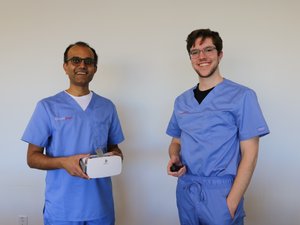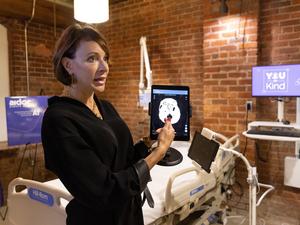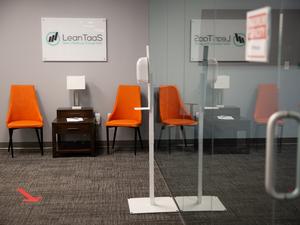
Charlotte's health-tech market continues to show strong signs of growth, experts say, despite a challenging economic environment that caused a slump in venture capital funding for the sector last year.
Health-tech VC funding landed at $27.5 billion in 2022, a 30% drop from $39.3 billion in 2021, according to Deloitte's 2023 health-tech investment trends report. Last year's investments, however, were still roughly 30% higher than in 2020 and more than doubled from 2019.
Peter Micca, Deloitte's national health-tech leader, told CBJ he's increasingly seeing markets like Charlotte demonstrate a deep commitment to disrupting health care through innovation. He said that became especially apparent after the pandemic surfaced.
"What we're seeing in the marketplace is that corporate venture, private equity and venture capital is still moving into the space in an almost unprecedented way," Micca said. "But most investors that we speak with are truly viewing this as a very significant opportunity to invest in innovation."

The industry growth is reflected in health-tech companies' average valuations, which have increased each year from 2016 to 2022, the Deloitte report shows. For example, last year's median health-tech valuation landed at $57 million — a jump from $34 million in 2021 and $28 million in 2020.
"There have been a number of very prominent investments in well-established health-technology companies," Micca said. "Companies that have well-established solutions are getting funded. Some of those companies will struggle, but we're seeing a lot of add-on rounds — Series B, Series C, Series D in these types of companies."
Micca said some health-tech businesses may struggle to receive funding due to not being able to articulate the return on investment to a potential buyer of its services. That, he noted, was normal through "ebbs and flows of technology innovation cycles."
Innovators focused on growth are identifying ways to bridge longer funding cycles, Deloitte's report states.
Why Charlotte is a prime market for health tech
Dan Roselli, co-founder of RevTech Labs — a Charlotte-based accelerator focused on health tech, fintech and insurance tech — said he believes Charlotte has identified digital health as a core industry. He remains optimistic of the region becoming internationally known for health innovation, just as the city has done for other sectors such as fintech.
"We have all the right material and DNA," Roselli added.

The growth kick for health tech in Charlotte seems to be a long-term trend, he said. For instance, the city has made commitments to the industry with the development of the Wake Forest University School of Medicine Charlotte and innovation district known as “The Pearl.” That area will be be home to the city's first four-year med school.
Another example is how Charlotte's Novant Health Innovation Lab recently launched a membership program to help startups break into health tech.
Jeff Seremak, a Charlotte-based partner at Deloitte, said the Research Triangle Park area is where a majority of venture funding is happening in North Carolina. However, he said, Charlotte is second on the list.
More innovators are becoming drawn to the area due to its access to several universities and its roots as a financial hub, Seremak said.
"I do think it's becoming more and more of a hotbed for startups and that's incentivizing startups to pick Charlotte because there is opportunity here," he added.
Investors more cautious of lending capital
Roselli says though health-tech funding slid in 2022, it just means the numbers have returned to pre-pandemic norms. Macroeconomic issues such as higher interest rates and concerns of a possible recession have caused investors to hold off on lending money to companies to see how these factors will resolve, he noted.
"So, at some point in the next 12 months, we're going to be having a conversation about how do we go from where people are worried about the market, to one of the world's robust investment markets in health innovation," Roselli said. "You can see the pent-up demand being built up."
Seremak said funds are still flowing into North Carolina and the health-tech space, but many investors are being more cautious about how they're deploying capital.
"Given the macroeconomic environment and that there's a slowdown, a number of VC firms said they have capital to deploy, but they're being strategic about it," he added.
Amid tough economic periods, entrepreneurs may also become more attentive on how they may expand or bring a product to market, Roselli said. That shows that innovation doesn't come to an end in a slower economy and may also yield improved results for health-tech companies.
"The demand for innovation and technology in the (health-tech) industry still far exceeds the supply," Micca said. "And we don't see that change occurring anytime soon."







